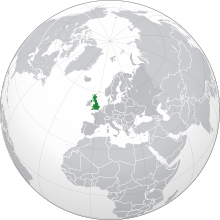United Kingdom of Great Britain and Northern Ireland: Difference between revisions
m (Added categories.) Tag: Visual edit |
m (Added link.) Tag: Visual edit |
||
| Line 8: | Line 8: | ||
| government_type = [[Unitary state|Unitary]] [[Parliamentary system|parliamentary]] [[Bourgeois state|bourgeois state]] | | government_type = [[Unitary state|Unitary]] [[Parliamentary system|parliamentary]] [[Bourgeois state|bourgeois state]] | ||
| leader_title1 = Monarch | | leader_title1 = Monarch | ||
| leader_name1 = Elizabeth II | | leader_name1 = [[Elizabeth II]] | ||
| leader_title2 = Prime Minister | | leader_title2 = Prime Minister | ||
| leader_name2 = Boris Johnson | | leader_name2 = [[Boris Johnson]] | ||
| sovereignty_type = Formation | | sovereignty_type = Formation | ||
| established_event1 = Annexation of Wales by the Kingdom of England | | established_event1 = Annexation of Wales by the Kingdom of England | ||
Revision as of 19:04, 4 September 2022
| United Kingdom of Great Britain and Northern Ireland | |
|---|---|
|
Flag | |
 | |
| Capital and largest city | London |
| Government | Unitary parliamentary bourgeois state |
• Monarch | Elizabeth II |
• Prime Minister | Boris Johnson |
| History | |
• Annexation of Wales by the Kingdom of England | 1536 |
| Area | |
• Total | 242,495 km² (78th) |
| Population | |
• 2020 estimate | 67,886,004 |
| Labour | |
• Labour force | 34,708,550[1] |
• Labour force participation | 78.1%[3] |
• Occupation | agriculture: 1.3% industry: 15.2% services: 83.5%[4] |
• Unemployment rate | 4.8%[2] |
| GDP (nominal) | 2021 estimate |
• Total | $3.124 trillion[5] |
• Per capita | $46,344[5] |
| Exports | 2019 estimate |
• Value | $894.077 billion[6] |
• Commodities | cars, gas turbines, gold, crude petroleum, packaged medicines[4] |
• Partners | United States (15%), Germany (10%), China (7%)[4] |
| Imports | 2019 estimate |
• Value | $924.69 billion[7] |
• Commodities | gold, cars, crude petroleum, refined petroleum, broadcasting equipment[4] |
• Partners | Germany (13%), China (10%), Netherlands (7%) |
| External debt | $8.721 trillion[4] (2nd) |
| Gini (2018) | 33.5% |
| HDI (2019) | 0.932 |
| Currency | Pound sterling (GBP) |
The United Kingdom of Great Britain and Northern Ireland, often shortened to the United Kingdom or UK, is an imperialist island country located in Europe.
Colonialism
The British Empire colonized parts of North America, Africa, Asia, and Oceania and controlled nearly 25% of the world's land area at its peak.[8]
Africa
During the Boer Wars in South Africa, the British destroyed farms and dumped salt in wells. In the Second Boer War, between 1899 and 1902, they built over 100 concentration camps for Boers and Africans. 30,000 Boers died in these camps, mostly children, as well as 20,000 Africans who were not largely involved in the war.
During the Mau Mau Uprising of 1952 in Kenya, nearly the entire civilian population of the Kikuyu was placed in work camps by the British. Some were dragged across the ground by military vehicles or mauled by guard dogs.[8]
Asia
Over five million Indians died in famines during the 1870s under the British Raj. During another famine in 1943, Prime Minister Winston Churchill blamed the Indians for the famine, saying "Famine or no famine, Indians will breed like rabbits."
In 1903, the British Indian Army invaded Tibet due to rumors that the Qing dynasty was going to allow Russia to occupy Tibet. When they encountered 3,000 Tibetans blocking a road, they fired on them, killing over 700 people. Parts of Tibet were occupied by the British until 1908.
In Amritsar, Punjab, in 1919, a large crowd gathered to celebrate the festival of Baisakhi. The British Indian Army blocked the exits and fired on the crowd, killing over a thousand and wounding 1,100 more.
During the Malayan Emergency of the 1950s, the British forcibly relocated Chinese people in Malaya into 450 "New Villages." No one was allowed in or out without the permission of the guards.[8]
Ireland
In 1845, potato blight destroyed the potato harvest in Ireland, beginning a famine. The British appointed Charles Trevelyan to administer Ireland during the famine. Trevelyan adopted a laissez-faire attitude and wrote that the famine was an "effective mechanism for reducing surplus population" and "the judgement of God to teach the Irish a lesson." Exports of food from Ireland increased during the famine and over a million people died in the famine.[8]
References
- ↑ World Bank (2020). Labour force total – United Kingdom.
- ↑ Trading economics (2021). United Kingdom unemployment rate
- ↑ World Bank (2019). Labor force participation rate, total (% of total population ages 15-64) (modeled ILO estimate) - United Kingdom
- ↑ 4.0 4.1 4.2 4.3 4.4 CIA World Factbook (2020). United Kingdom – The world factbook (economy)
- ↑ 5.0 5.1 International Monetary Fund (2021). World Economic Outlook database: April 2021
- ↑ World Bank (2019). Exports of goods and services (current US$) - United Kingdom
- ↑ World Bank (2019). Imports of goods and services (current US$) - United Kingdom
- ↑ 8.0 8.1 8.2 8.3 Larry Holzwarth (2018-03-17). "10 Atrocities Committed by the British Empire that They Would Like to Erase from History Books" History Collection. Archived from the original on 2021-06-16. Retrieved 2022-05-21.
